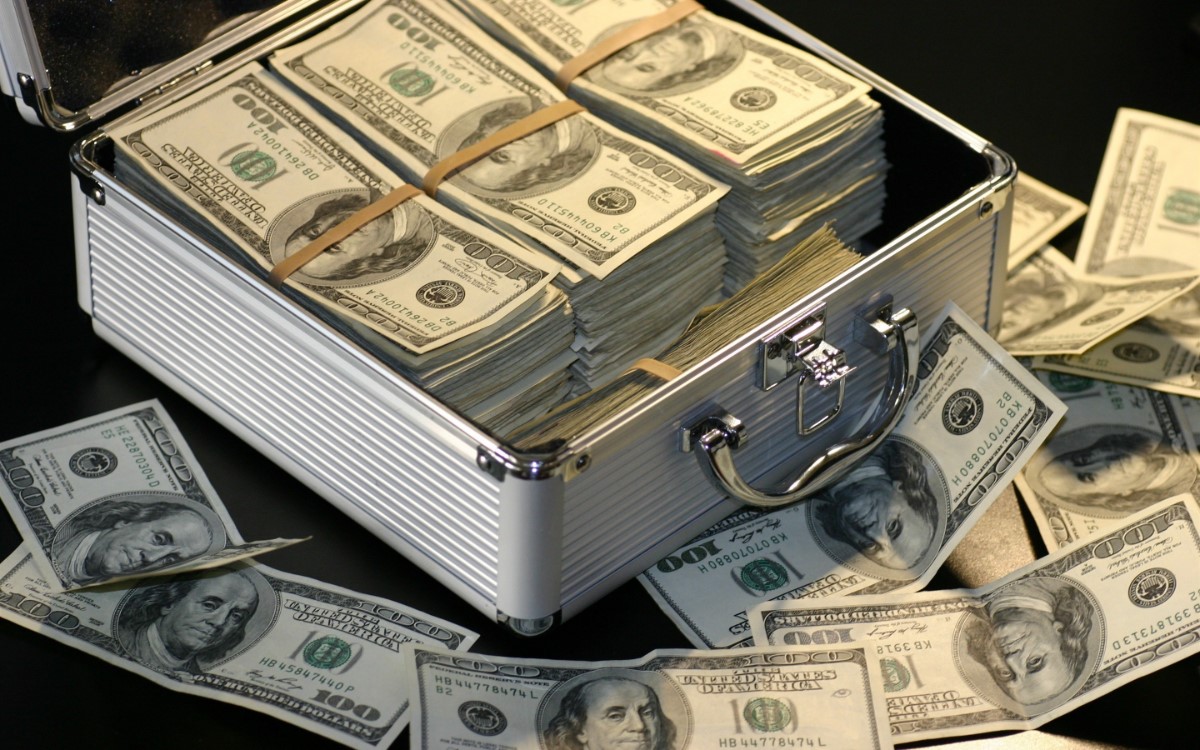Traveling with cash can be a necessity, especially when you need to cover unexpected expenses or if you’re going to less digitally connected places.
You might wonder how much cash you can legally fly with on a plane.
Whether it’s for personal use, business transactions, or gifts, knowing the rules and regulations surrounding this issue can help make your journey smoother and hassle-free.
In the United States, there is no limit on the amount of cash you can bring on a domestic flight, such as from Denver to Dallas, for example.
However, when traveling internationally, you should be aware of the required declaration limit set by the United States Customs, which is $10,000.
This means that if you’re carrying cash or other monetary instruments with a combined value exceeding $10,000 (or its foreign equivalent), you are required to declare this amount upon entering or leaving the country.
It’s essential to understand that this rule applies not only to individual travelers but also to families: if your family members jointly own cash and monetary instruments that exceed $10,000, you should declare this amount on your customs form.
By being aware of these regulations, you can ensure a stress-free journey and avoid potential penalties related to undeclared cash.
Here’s a close look at how much cash can you fly with on a plane.
Post Contents
How Much Cash Can You Fly with on a Plane? Cash Limits for Domestic Flights

TSA Regulations
When it comes to flying within the United States on domestic flights, there is technically no limit as to how much cash you can carry.
However, the TSA (Transportation Security Administration) might question you if you carry an excessive amount of cash in your luggage.
Carry-On vs Checked Baggage
You can choose to pack your cash in either your carry-on or checked baggage:
- Carry-On Baggage: Keeping cash in your carry-on bag allows you to monitor it more closely. This option mitigates the risk of theft or misplaced luggage containing your money. Just be prepared to answer any questions the TSA screener may have at the security checkpoint.
- Checked Baggage: Storing cash in your checked luggage involves the risk of theft during baggage handling, or your luggage getting lost or delayed. Should you opt to place your cash in your checked baggage, consider using a lock on your suitcase or a hidden compartment.
Keeping Cash Safe
Being mindful of your cash when flying is vital. Here are a few practical tips:
- Use a money belt or hidden pouch to store your money close to your body, effectively concealing it from potential thieves.
- Place cash in separate compartments of your bags. If someone manages to access your bag, they might not locate all your cash if it’s distributed in various pockets.
- If you’re carrying a large sum, be cautious not to draw attention to it. You don’t want others in the airport noticing the amount of cash you have.
- Be aware of the prohibited items list. Avoid carrying items that might prompt a more thorough search by the TSA, potentially revealing your cash stash.
Carrying Cash on International Flights
Customs Declaration
When flying internationally, you must be aware of customs regulations regarding the amount of cash you can carry.
If you have cash, monetary instruments, or their equivalent totaling more than $10,000, you are required to declare it to Customs and Border Protection when entering or leaving the United States.
Currency and Monetary Instruments
Currency and monetary instruments include not only cash but also traveler’s checks, cashier’s checks, money orders, gold coins, and negotiable instruments.
When combining these items, ensure that the total value does not exceed the $10,000 limit without declaration. For example:
- If you have $6,000 in cash and a $5,000 traveler’s check, the total is $11,000, which requires declaration.
- If a family traveling together has a combined total of more than $10,000 (e.g., husband with $4,000 and wife with $7,000), they must jointly declare the amount.
FinCEN Form 105
If the total value of cash and monetary instruments exceeds $10,000, you must complete and submit a FinCEN Form 105, also known as the Report of International Transportation of Currency or Monetary Instruments.
This form must be provided to customs when entering or exiting the United States. Here are the key points:
- Make sure to accurately report the amount of cash and monetary instruments that you are carrying.
- Provide personal identification information such as your name, date of birth, and contact information.
- Explain the purpose of transporting the funds.
- Include details about your travel itinerary.
Legal Implications and Consequences
When you’re traveling with large amounts of cash, it’s crucial to understand the potential consequences that might arise if you fail to adhere to the law.
Civil Asset Forfeiture
Carrying significant amounts of cash can subject you to the risk of civil asset forfeiture.
This is a process wherein law enforcement agencies seize your money if they suspect it may be related to criminal activity, even if you are not charged with a crime.
In these cases, it is up to you to prove your cash is not linked to unlawful activities. So, it’s better to keep proof of the source and purpose of the money when carrying large sums.
Criminal Activity
Traveling with substantial cash amounts can draw unwanted attention from law enforcement officers.
They may suspect you of involvement in activities such as money laundering or drug trafficking.
To avoid such accusations, make sure to have documentation proving the money’s legality on hand, and be prepared to answer airport police officers’ questions.
Fines and Penalties
Carrying more than $10,000 in cash into or out of the United States without declaring it can result in significant fines and penalties.
Declare amounts exceeding $10,000 to a law enforcement representative at the airport, and remember that this limit applies to both individual travelers and family groups.
Traveling with Large Amounts of Cash
Reasons to Carry Large Amounts
There could be multiple reasons why you might want to carry large amounts of cash when you fly.
You could be making a significant purchase, attending a special event, or perhaps you are relocating and want to bring your savings with you.
Whatever the reason, it’s essential to understand how to safely and legally travel with large sums of money.
How to Carry Large Amounts Safely
It’s critical to prioritize the security of your funds while traveling. You can take the following steps to ensure the money’s safety:
- Distribute the cash amongst different hiding spots in your luggage, keeping some in multiple bags or with different family members.
- Use money belts or hidden pouches under your clothes to keep cash secure and hidden.
- Consider converting some of your cash to traveler’s checks, which can be easily replaced if lost or stolen.
- Keep a close eye on your belongings at all times, particularly in crowded or high-risk areas such as airports and train stations.
When to Declare it
When flying within the United States, there is no limit to the amount of cash you can carry on a domestic flight.
However, carrying large amounts of cash, particularly over $10,000, may attract attention from the TSA, which could lead to additional screening.
If you are traveling internationally, you are required to declare any amounts over $10,000, including cash, money orders, and traveler’s checks.
Suppose you are traveling with family members residing in the same household. In that case, you must declare the combined amount if it exceeds $10,000.
Failing to declare large amounts of cash can result in penalties or fines, so it’s essential to comply with the regulations.
To avoid any complications, always declare your cash at customs when required, and be prepared to answer any questions about your travel plans or the purpose of carrying such a large sum.
Currency Regulations in Destination Countries
Understanding Exchange Limits
When traveling internationally, it’s essential to be aware of the currency regulations in your destination country.
Many countries have exchange limits on the amount of cash you can bring in or take out. Always check the specific rules of the country you’ll be visiting to ensure you’re in compliance.
The most common threshold is $10,000 or its equivalent in other currencies. This includes not only cash but also equivalent instruments like traveler’s checks, bank drafts, and bonds.
If you’re carrying more than the specified limit, you’ll need to declare it when entering or exiting the country.
Keep in mind that these regulations may vary, and sometimes they apply to families as a group, not just individual travelers.
Embassy and Consulate Contacts
In case you have questions about the currency regulations or need assistance during your trip, it’s always wise to have the contact information of your country’s embassy or consulate in your destination country.
They can provide up-to-date information on regulations as well as assistance in case you face any issues related to currency declaration or exchange.
To help make your international travel smooth and stress-free, consider the following tips:
- Research the currency regulations of your destination country before your trip
- Keep a record of the embassy or consulate contact information in case you need assistance
- Declare any amount of cash or equivalent instruments above the specified limit upon arrival and departure
- Be prepared for additional scrutiny or questioning by customs authorities if you’re carrying large amounts of cash or equivalent instruments
When Cash Is Not an Option
Alternatives to Carrying Cash
In situations where carrying cash on a plane might be risky or subject to scrutiny, there are other alternatives you can consider:
- Travelers checks: These can provide the same convenience as cash without the associated risks. In the event of loss or theft, travelers checks can be replaced, ensuring that your funds remain safe during your travels.
- Prepaid debit cards: Another option is to use prepaid debit cards, which allow you to load money onto them prior to travel. These cards can then be used internationally and can help avoid issues with customs requirements or limitations on cash amounts.
- Bank transfers: Setting up a bank transfer to your destination before you leave home can be an efficient way to access your funds without physically carrying cash across borders. Be aware, however, that fees may apply, and exchange rates can fluctuate.
- Digital wallets: Services like PayPal or Google Wallet allow you to store currency and pay for items electronically without the need for physical cash. Having a digital wallet can be convenient and often has associated benefits such as fraud protection.
Bearer Bonds
Bearer bonds are another option if you’re looking to transport larger sums of money without the complications that can come with traveling with cash.
These bonds are unregistered, meaning that the holder (bearer) of the bond is presumed to be the owner.
This method allows for a degree of anonymity and can mitigate the risk of losses or confiscation by customs authorities.
However, bearer bonds have their own set of risks and drawbacks. For one thing, they’re not as widely accepted or as easily liquidated as cash.
Additionally, bearer bonds can still be subject to regulations, including anti-money laundering and counter-terrorist financing rules.
A word of caution: some items may be strictly regulated or prohibited in certain countries, such as marijuana.
Always research the laws and restrictions of the countries you’ll be traveling to beforehand and make informed decisions about what you can and cannot carry with you.
Key Takeaways
When flying, you might wonder how much cash you can legally carry with you on a plane. Here are some important points to keep in mind:
- For domestic flights within the United States, there is no limit on the amount of cash you can carry with you. However, it’s worth noting that carrying a large sum of money may draw attention from Transportation Security Administration (TSA) agents, who might question you about the purpose of carrying such an amount.
- When traveling internationally, the rules change. Specifically, if you’re entering or leaving the United States, you must declare any amounts over $10,000 USD to customs. Not declaring amounts over this limit can lead to penalties, so be diligent when filling out customs forms.
- If you’re unsure about the regulations in other countries, it’s a good idea to look up the specific rules for the destination you’re planning to visit. Different countries may have their own restrictions and reporting requirements when it comes to carrying cash.
- Family members traveling together need to be aware of the joint declaration rules. If the combined cash and other monetary instruments owned by family members exceed $10,000, they must collectively declare it on their customs forms.
By keeping these key points in mind, you can ensure that you’re complying with legal requirements and avoid any potential trouble when flying with cash.






























